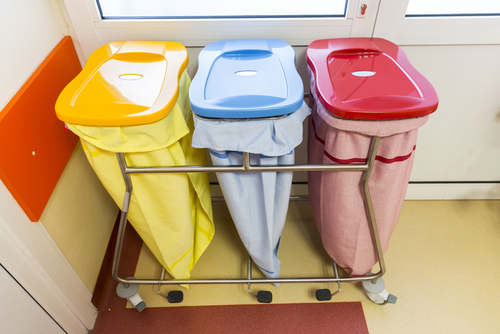Recycling your healthcare business waste
 Your local council may offer collection and recycling services for some business waste. There are also many private waste contractors that offer this service. You can find a waste contractor near you by using the NetRegs waste directory.
Your local council may offer collection and recycling services for some business waste. There are also many private waste contractors that offer this service. You can find a waste contractor near you by using the NetRegs waste directory.
What you must do
Materials that you intend to recycle or recover are still likely to be classified as waste. You must ensure that you comply with your waste responsibilities.
The Duty of Care affects all businesses. You must make sure:
- your waste is stored, handled, recycled or disposed of safely and legally
- your waste is stored, handled, recycled or disposed of only by licensed individuals or businesses
- you record all transfers of waste between your business and another business, using a waste transfer note (WTN)
- you keep all WTNs, signed by both businesses, for at least two years
- you record any transfer of hazardous/special waste between your business and another business, using a consignment note
- you keep all consignment notes, signed by both businesses, for at least three years.
Duty of care - your waste responsibilities
Using consignment notes for hazardous/special waste
Waste carriers, brokers and dealers
Some materials and equipment that you can recycle may be classified as hazardous/special waste. For example some waste electrical and electronic equipment (WEEE) must be segregated from other WEEE. For example:
- equipment such as fridges and freezers that contain ozone depleting substances
- televisions and monitors that contain cathode ray tubes
- WEEE contaminated with potentially infectious bodily fluids, eg diagnostic medical devices and implants.
Waste electrical and electronic equipment
Carefully segregate clinical waste from any waste that you are going to recycle. Clinical waste requires specialist treatment and disposal. You should not mix it with waste for recycling.
Good practice
Identify the types of waste that your business produces. Consider how you can keep this waste to a minimum and what can be recycled. Encourage your staff to contribute ideas.
Reduce, reuse and recycle your business waste
- Make it easy for staff and visitors to recycle their waste. Label suitable containers and make it clear which type of waste they should put in each. Display this information prominently and provide clear instructions.
- Provide staff training on good waste management practice.
- Where possible, supply food or drink in reusable containers.
- Reduce your use of paper. You could do this, for example, by printing two-sided documents and by using email and the internet for business communications and marketing.
- Recycle cardboard from any packaging. Ask your suppliers to use re-usable packaging for transit.
- If you are refurbishing your premises or disposing of old furniture items, consider donating them to the Recycling Network or a similar charity.
You may be able to get your waste catering oils reprocessed into biofuels such as biodiesel.
Further information
- Reduce, reuse and recycle your business waste
- Find your nearest waste site
- Zero Waste Scotland
- Wrap Northern Ireland: SMEs
